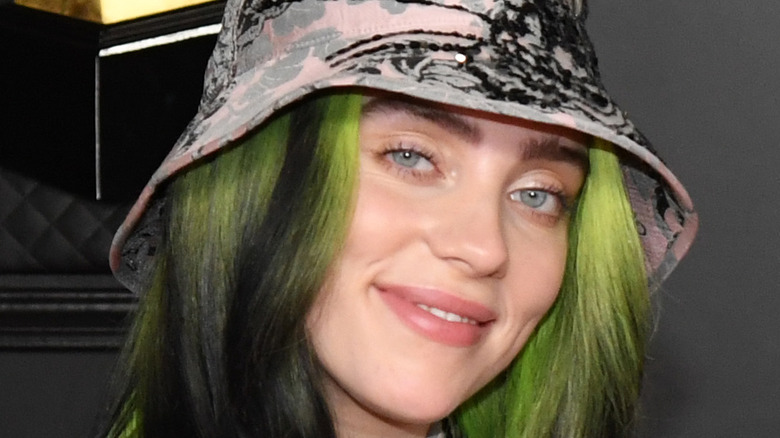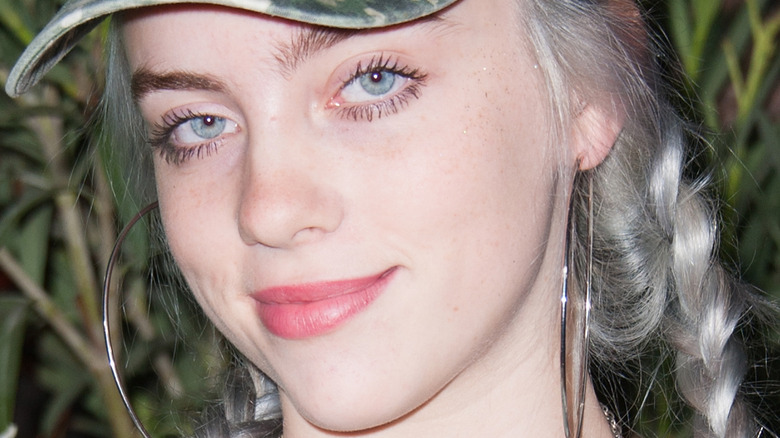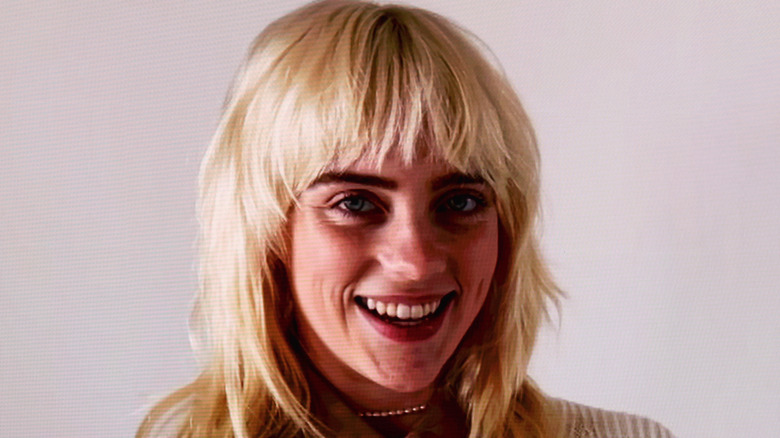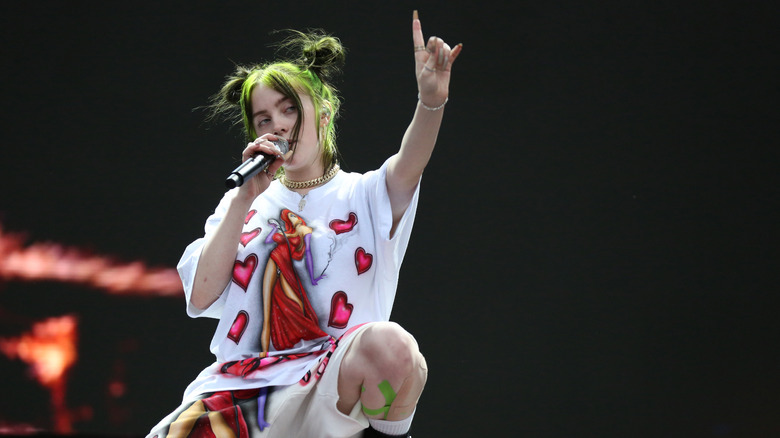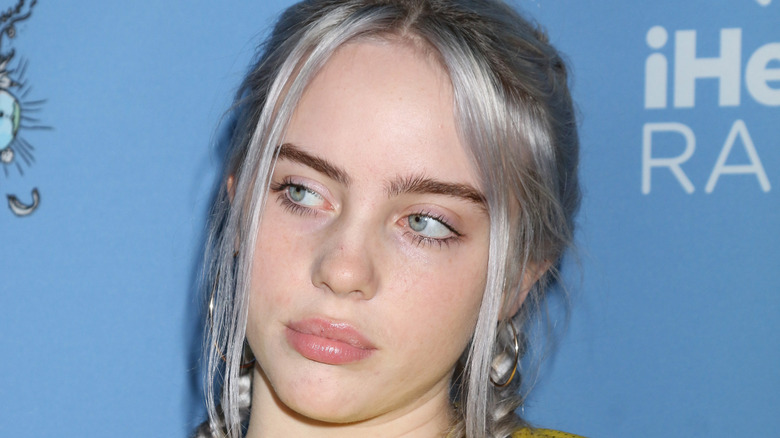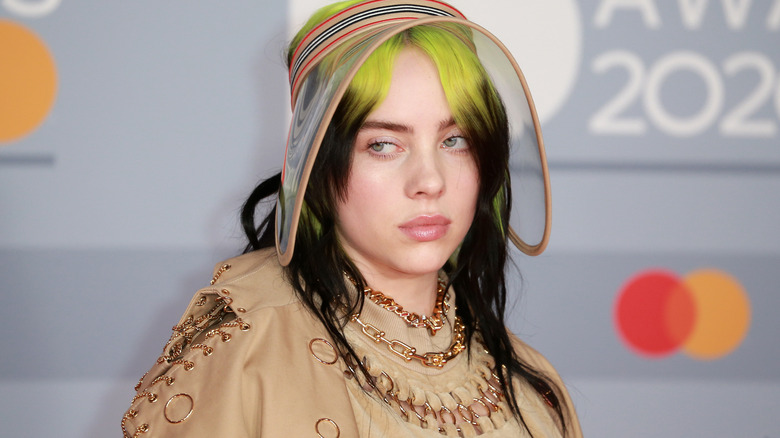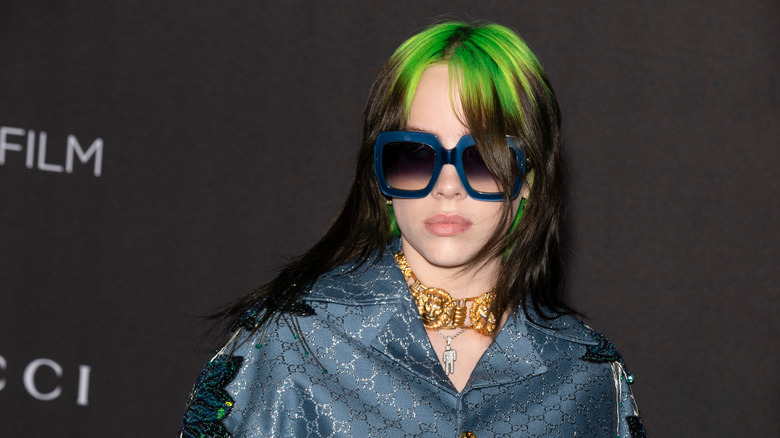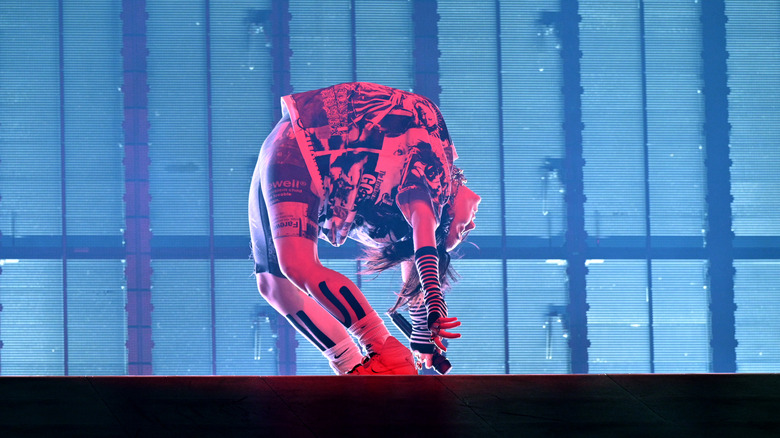Billie Eilish's History With Tourette Syndrome Explained
Billie Eilish is an outlier. Born "Billie Eilish Pirate Baird O'Connell," the talented songstress, was born on December 18, 2001, in Los Angeles, California. She was homeschooled throughout her childhood, was writing songs by the age of four, and became an overnight pop music success at the age of 13 after she recorded a song written by her older brother. That song, "Ocean Eyes," went viral on SoundCloud, per BBC's Newsround.
By the time Eilish turned 14, she had inked a major record deal. When she was just 18, Eilish won five Grammy Awards and became the youngest Best Album Grammy-winner ever and the "only woman to sweep all four major categories at the Grammys," according to Insider. Before she turned 21, Eilish had already written and performed a Bond-movie theme, becoming the youngest artist ever to do so (via Newsround). The song, "No Time To Die," became Eilish's first song to top the U.K. charts, according to Billboard. The song also recorded the biggest-ever opening week for a Bond-movie theme.
Long before Eilish became famous, though, she was diagnosed with Tourette syndrome, as she detailed on "The Ellen Degeneres Show." Read on to learn about the singer's history with the neurological disorder.
What is Tourette syndrome?
Tourette syndrome, a neurological disorder, is characterized by sudden, involuntary movements or noises that are known clinically as "tics," according to the National Institute of Neurological Disorders and Stroke. It is one of several nervous system conditions that cause tics, but probably the most well-known of the so-called "tic disorders." Tics are characterized as either motor (involving movement) or vocal (involving sound) and as either simple (involving brief, repetitive movements involved a limited number of muscle groups) or complex (involving "distinct, coordinated patterns of movement involving several muscle groups").
Generally with Tourette syndrome, the first tics are observed between the ages of five and 10 years of age. Most often, the first tics are motor and involve the head and neck. Over time, the tics may progress to include the trunk and limbs. Tourette syndrome is often a chronic health condition, with tics coming and going over time. Tics tend to occur more frequently and more intensely during the teenage years. Although they may lessen in severity and frequency with age, tics can worsen in and throughout adulthood for some individuals.
Tics are often exacerbated by stress, excitement, anxiety, and discomfort. They may also occur during light sleep, including while dreaming. Some people with Tourette syndrome require treatment to help prevent their tics from interfering with their daily lives. Tourette syndrome is not a degenerative disorder like multiple sclerosis or Parkinson's disease. As such, people with the condition have a normal life expectancy.
How Tourette syndrome presents in people who have the condition
Most cases of Tourette syndrome are believed to be genetic in origin, according to the National Institute of Neurological Disorders and Stroke (NINDS), although like many inherited disorders, environmental factors may play a role in whether and to what extent the condition develops in any individual. Someone whose parent has Tourette syndrome may not necessarily develop the disorder at all or may develop a mild non-Tourette tic disorder.
Complex motor tics, which tend to develop over time, involve combinations of simple motor tics such as "facial grimacing combined with a head twist," per NINDS. Although complex motor tics are involuntary, by definition, some may appear intentional. For example, complex motor tics may involve hopping around or twisting one's body. According to Andrew Joannou, who is in middle age but has been dealing with Tourette syndrome since the age of six, the way it feels to experience a motor tic is comparable to what it feels like when you have the impulse to sneeze (via The Healthy).
Tourette syndrome is also experienced as vocal tics. Simple vocal tics are characterized by more primitive noises such as "throat clearing, sniffing, barking, or grunting sounds" (via NINDS). Complex vocal tics are characterized by actual words and may include repeating words and phrases, including swear words.
Billie Eilish experiences 'only physical' tics with Tourette syndrome
"Having a neurological disorder isn't really something Eilish thinks about," The Fader wrote in 2019 after interviewing Eilish. "It's been a part of most of her life." But she does tend to become more conscious of it whenever she experiences, or has reason to suspect she's at risk for experiencing, a tic episode. And since, as Eilish told The Fader, she is "really good at suppressing" hers, members of the public who may believe they have detected Eilish experiencing a tic have not necessarily witnessed the full extent of her condition.
Eilish herself revealed on Instagram that the tics are "only physical and not super noticeable to others if you're not really paying attention" (via Popbuzz). Eilish didn't go into detail about the nature of her tics when writing to her fans on Instagram, but she did explain that "certain things increase and/or trigger the intensity of my tics."
How Billie Eilish broke the news to her fans that she has Tourette syndrome
In November 2018, pop star and extraordinary musical talent Billie Eilish broke the news of her Tourette syndrome diagnosis. The then-16-year-old wrote, "I would love to get this straight so everyone can stop acting goofy ... I have diagnosed Tourettes" (via PopBuzz).
By "acting goofy," Eilish was referring to several video compilations of Eilish experiencing tics were making their way around the internet — although many who saw those videos may not have realized that Eilish was dealing with a medical condition. As it turned out, most of the tics included in those videos represented tics that Eilish had carefully managed so as to be less noticeable.
"I've taught myself ways of suppressing my tics and certain techniques to help [reduce] them when I don't want to be distracting in certain situations," she explained. It seems Eilish's hope seems to have been to not have to talk about her experience with Tourette syndrome. However, the compilations and resulting speculation ended up creating such a stir for Eilish's fans, as well as for Eilish, herself, that it felt to Eilish as if her hand had been forced. "Wasn't planning on talking about this on here maybe ever, but it's gotten to a point ... lol," she explained (via PopBuzz).
How Billie Eilish feels about those tic compilation videos
Part of Billie Eilish's charm has always been in her tendency toward "class-clownishness." In fact, it would appear that many of the video tic-compilations were not meant to speculate about the status of Eilish's health or to out her condition, but rather to simply capture Eilish's often-endearing and seemingly intentional but idiosyncratic approach to humor.
In fact, a large number of such videos bear objectively innocuous titles like "Billie Eilish Funny Moments." It's therefore reasonable to presume these videos were intended simply to offer viewers a good-natured chuckle with regard to a celebrity who seems to enjoy making people laugh.
Billie Eilish has never said that these video compilations are not funny. In reality, she told her fans on Instagram that the videos were "funny," albeit in a "low-key" kind of way (via Hollywood Life). With all of that being said, Eilish did point out to The Fader that the public has, for the most part, seen only mild tics from her because she's learned to suppress the "bad" ones. Accordingly, it's possible Eilish might feel less inclined to find humor in the videos if they were in any way mean-spirited or if they captured her in the midst of a more severe episode.
Why Billie Eilish kept her diagnosis a secret for as long as she did
ScreenRant pointed out that celebrities may want to have the space to sit with their diagnoses or "struggles" without having to cope with the public's reactions or need for reassurance. When it comes to a female celebrity who is still in her teen years, the need for "space" could be even greater (via Psychology Today).
When Billie Eilish revealed her Tourette syndrome diagnosis to her Instagram followers, she wrote, "I've never mentioned it on the internet because nobody thinks I'm deada** ... as well as the fact that I've just never wanted people to think of Tourettes every time they think of me." And as she told Ellen DeGeneres in 2019, "I just never said anything because I didn't want that to define who I was. I didn't want it to be like, 'the artist with Tourettes, Billie Eilish, is on 'Ellen.'"
Having Tourette syndrome makes easy things a lot harder for Billie Eilish
"My Tourette's makes easy things a lot harder," Billie Eilish wrote on Instagram when she first revealed her Tourette syndrome diagnosis (via Hollywood Life). Although Eilish said that she has developed strategies that help her suppress and manage her tics, she pointed out that "suppressing them only makes things worse after the moment is over." Yes, in Eilish's case, the dampened impulse can end up coming back stronger after she tries to suppress it. While Eilish understands how her tics could, of course, make some people uncomfortable, being the one to experience those tics "is a whole different type of misery."
One of the challenges that Eilish faces in dealing with Tourette syndrome is that certain things can trigger a tic or even increase a tic's intensity. So even if Eilish has every intention of suppressing a tic, that simply may not be possible under certain circumstances. "I've taught myself techniques ... when I don't want to be distracting in certain situations," she explained. However, those techniques are not foolproof by any means, and even less so when faced with circumstances that are particularly triggering for Eilish.
Additionally, what works for Eilish may not work for someone else with Tourette syndrome. "Tic suppression is possible, but whether this is practiced should be at the discretion and decision making of the Touretter themselves and not for any degree of intolerance," Tourette Canada cautioned.
Billie Eilish's diagnosis is sometimes misunderstood or ignored by others
One reason the public has not seen the severity of Billie Eilish's Tourette syndrome-related tics, according to the singer herself, is that family, friends, and those with whom she works tend to prioritize supporting Eilish's desire to keep her Tourette syndrome experience as private as possible. However, some of the people she has worked with don't always recognize what Eilish needs in terms of support, according to The Fader. For example, Eilish told the publication that when she needed a plaster cast of her face, she informed the crew that she had Tourette syndrome. However, she seemed to be ignored and things went awry, albeit not publicly.
For interviews, Eilish and her team like to arrange for pre-taping because most of Eilish's tics during interviews seem to occur while the interviewer is asking questions. However, that isn't always seamless either. As Eilish detailed to Ellen Degeneres, one pre-taped interview showed Eilish experiencing tics. As it turned out, it was from that interview that many of the Eilish tic-compilation videos arose. "It could be a lot worse," the singer told The Fader, but she also recognizes there's probably going to come a point when people will have a window into how severe her tics can be.
How revealing her Tourette syndrome diagnosis has helped Billie Eilish connect with fans
Throughout the first several years of her musical career, Billie Eilish, who was just a kid, tried to hide the fact that she deals with the tic disorder, Tourette syndrome. However, once the various "tic compilations" started making their rounds on the internet, essentially forcing her hand, Eilish revealed in a candid, black-and-white-text-only Instagram post, that she had been diagnosed with Tourette syndrome as a child (via Hollywood Life).
As it turned out, the upshot of Eilish's letting herself be vulnerable in this way was nothing less than an outpouring of positive reactions from her fans — not just those who suddenly were confronted with the reality that when you poke fun at someone, you may be attacking them right in the place where they are most vulnerable, but also those who, themselves, have been dealing with Tourette syndrome and other tic disorders.
In April 2019, Eilish told Ellen DeGeneres, "a lot of my fans have it, which made me feel kind of more at home with saying it." In addition, Eilish felt that "there was a connection there. When I said that, there were kids that were posting, like, 'Oh my god, I've always had this, and now she has it, and she's who I can look up to with it."
Billie Eilish's experiences sleep troubles in addition to Tourette syndrome
In bringing awareness to Tourette syndrome, Billie Eilish may also help bring awareness to the fact that Tourette syndrome does not often occur in a vacuum. Rather, "many individuals with [Tourette syndrome] experience additional co-occurring neurobehavioral problems" that may cause "more impairment than the tics themselves," according to the National Institute of Neurological Disorders and Stroke.
In fact, many children with Tourette syndrome will find that their tics become less frequent as they make their way through their teen years, but their associated neurobehavioral conditions worsen into adulthood. These conditions include, among a number of others, attention-deficit/hyperactivity disorder (ADHD) and obsessive compulsive disorder (OCD). People with Tourette syndrome may also experience sleep disorders (via ScienceDirect)
In a revealing interview with Zane Lowe, Billie Eilish went public with her sleep disorder (via NME). Not only does Eilish have difficulty falling asleep and staying asleep, but she also experiences night terrors, sleep paralysis, and recurring nightmares, all of which she said informed her album, "When We Fall Asleep, Where Do We Go." Although Eilish didn't specifically connect her sleep disturbances to Tourette syndrome, the connection is well-established (via Tourette Canada).
Billie Eilish's Tourette syndrome may contribute to another health issue
Other health conditions frequently associated with Tourette syndrome are various mood disorders, including anxiety, depression, and disruptive behavior-related disorders, according to the University of California at San Francisco, reporting on a 2015 study conducted by an international group of researchers known as the Tourette Syndrome Association International Consortium for Genetics (TSAICG). "Nearly 86 percent of patients who seek treatment for Tourette syndrome (TS) will be diagnosed with a second psychiatric disorder during their lifetimes, and nearly 58 percent will receive two or more such diagnoses," the university revealed. "Mood disorders, anxiety disorders and disruptive behavior disorders are quite common in TS patients," with about 30% receiving at least one such diagnosis.
"Anxiety and depression, which in the general population often emerge in adolescence and adulthood, are more likely to emerge early in life with TS, sometimes as early as age 5," according to one of the study's lead authors, Dr. Jeremiah Scharf. Sharf continued, saying that anxiety and attention-deficit/hyperactivity disorder can even precede tics.
"Nobody that knows me thinks I'm a dark person," Billie Eilish told "CBS Sunday Morning" in January 2020, but the fact is that Eilish has struggled with mood disorders, including anxiety and depression. In her interview with Zane Lowe, Eilish even tied them to her sleep disturbances (via NME).
'It doesn't make you weak to ask for help,' according to Billie Eilish
The fact that Tourette syndrome now has mega-talented musical superstar Billie Eilish as one of its few celebrity faces is greatly appreciated by many with the disorder, including Gretchen Gale, someone who has been dealing with Tourette syndrome her whole life. In fact, she wrote about how Eilish has become an icon for her. The fact that Eilish has also come out as having Tourette-related health issues, including sleep disturbances and mood disorders, is also seen as valuable to mental health advocates.
In 2019, Eilish gave a brief, heartfelt interview for the Ad Council, which sought to empower teens and young adults to talk openly about their mental health issues and to be there for their friends in need. The interview was part of the Seize the Awkward movement, a public service campaign sponsored by the Ad Council, along with the Jed Foundation and the American Foundation for Suicide Prevention (via USA Today). "It doesn't make you weak to ask for help. It doesn't." Eilish said in the interview. "You should be able to ask anyone for help," she continued.
She called living with Tourette's 'very exhausting'
David Letterman recently returned to television with his Netflix talk show, "My Next Guest Needs No Introduction." Billie Eilish was a guest on the premiere. While the two were chatting, Eilish experienced a tic, per Billboard. A fairly common tic for Eilish (this one involved small movements of the head), it nevertheless served as a crossroads for the interview. You see, Billie Eilish could have chosen to gloss over the tic or ignored it altogether; instead, she used it as an opportunity to share what it is like for her to live with Tourette syndrome, per YouTube.
"I actually really like answering questions about it because it's really interesting, and I am incredibly confused by it, and I don't get it," Eilish told Letterman. Letterman admitted that he, himself, felt some confusion. As he observed her tic, he explained, at first he wondered if she was responding to something he'd said.
"I never don't tic at all," Eilish clarified, and while some of her tics are less apparent than others, Eilish is never not aware of what's happening. Understandably, therefore, she finds her tics "exhausting." The irony, of course, is that tics tend to worsen when one is fatigued, according to a 2010 Opinion Statement published in Current Treatment Options in Neurology, as well as when one is stressed or feeling anxious.
She recently opened up about some of her tics
As discussed above, Billie Eilish is aware of the various tic-compilation videos that have become endemic to the internet. However, she has always made a point of responding graciously, even characterizing them as "low-key funny" in an Instagram story, per Hollywood Life. That being said, some people with Tourette syndrome and other tic disorders present with far more noticeable tics than Eilish, whose tics are generally not so severe that she hasn't been able to develop her own little hacks to suppress them, at least to some extent. Moreover, the way that Eilish's Tourette syndrome presents, some tics are subtle enough that they aren't even detectable by others.
As Eilish clarified to David Letterman on his Netflix talk show, "My Next Guest Needs No Introduction," there is never a time when she is absolutely tic-free. In fact, some of her tics go on "all day long," as she put it. "The main tics that I do constantly, all day long, are like, I wiggle my ear back and forth and raise my eyebrow and click my jaw." Other tics that occur frequently throughout the day including flexing her arms in various ways. But if you were sitting across from Eilish and having a conversation with her, these are the sort of tics that she says "you would never notice."
She doesn't tic at all while she's performing
Billie Eilish does not allow Tourette syndrome to keep her from doing the things she loves, including dancing, riding horses, and moving her body in general. In fact, just the opposite. Eilish is not only a trained dancer but has danced competitively, according to Seventeen. Further, at least one of the songs she is most famous for, "Ocean Eyes," came about as an accompaniment to a dance routine she was choreographing for herself.
"Like music, dance has always been my passion — a way to express how I feel," she told Vice's i-D magazine back in 2016. Eilish also rides horses and, while still a pre-teen, learned to perform on aerial silks, according to 93.3 FLZ. Fortunately, Eilish finds that when she is "focusing" on these pursuits, as well as when she is singing, her tics tend to diminish in frequency, according to Harpers Bazaar. In fact, Eilish told David Letterman on "My Next Guest Needs No Introduction" that when she is performing, she has no tics at all (via Penn Live). Perhaps not surprisingly, studies confirm that exercise is an effective treatment for tic disorders, per Tourette Canada.
How Billie Eilish embraces Tourette Syndrome
Although Billie Eilish seems to have made peace with the tic compilation videos, per Hollywood Life, that does not preclude her from having some feelings about people finding humor in her tics. In fact, as she told David Letterman on "My Next Guest Needs No Introduction," she is "incredibly offended" when people laugh at her tics, assuming she's "trying to be funny" (via Penn Live). That being said, such feelings on Eilish's part do not derive from any sort of shame or wish to hide the fact that she lives with Tourette syndrome. Rather, it would appear that Eilish has come to embrace the condition as a part of her identity — per Fox News, Eilish has said that she has learned to be "friends" with Tourette syndrome.
Moreover, it would appear that Billie Eilish is increasingly inclined to raise awareness about Tourette syndrome — including using her own experiences as a touchstone. "What's funny is so many people have it that you would never know," Eilish told David Letterman during an interview for Letterman's show, "My Next Guests Needs No Introduction" (via Fox News). It appears Eilish may have a couple of specific artists in mind. However, "I'm not gonna out them," she clarified, "because they don't wanna talk about it."

